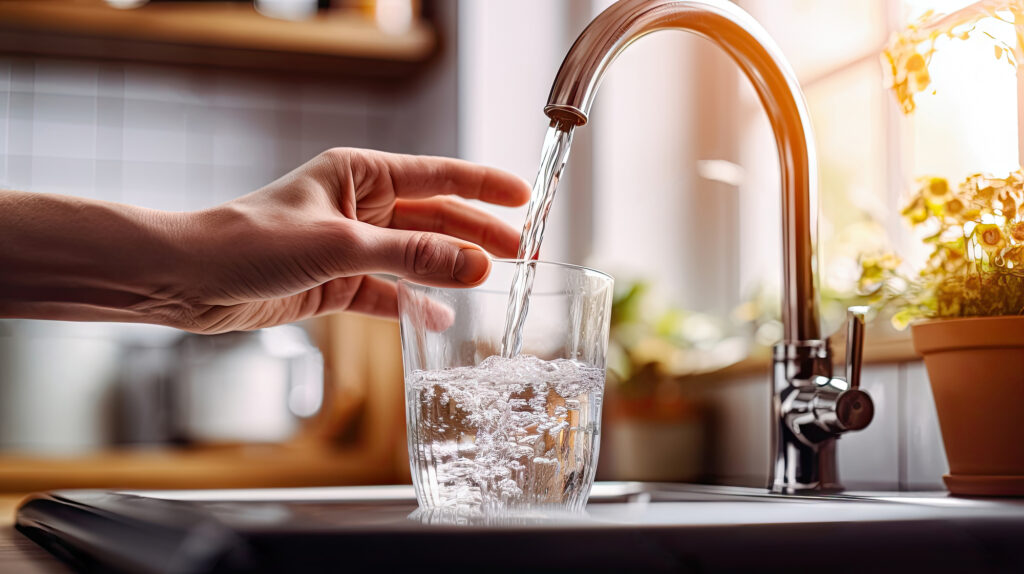Water is an essential part of every household. We use it daily for drinking, cooking, bathing, and more. But have you ever paused to think about its quality? What’s coming out of your tap can impact more than just your health. In fact, the quality of your water plays a significant role in determining your home’s worth.
A property with excellent water quality is often more valuable and desired by potential buyers. Moreover, pure, clean water can extend the life of your home’s structures and appliances. So, understanding and ensuring water quality isn’t just a health concern; it’s an investment in your home’s future.
The Basics Of Water Quality
Water, an essential component in every home, varies in quality. To ensure both our health and the longevity of our home assets, we need to discern between good and bad water quality.
Good water is characterized by its clarity, being odorless, and free from harmful substances. It’s safe for drinking, cooking, and other household activities. In contrast, bad water may have a cloudy appearance, an odd taste, or a strange odor. It’s the presence of contaminants in bad water that sets it apart.
Here’s a list of common contaminants:
- Lead: Often found in older plumbing systems, lead-contaminated water can result in numerous health issues.
- Chlorine: Used as a disinfectant, it can give water an unusual taste and produce harmful by-products when reacting with other compounds.
- Hard Minerals: Hard water contains minerals like calcium and magnesium. While not directly harmful to health, they can leave deposits and damage appliances.
- Pesticides And Herbicides: Chemical residues from agricultural practices can find their way into water sources.
- Microbial Pathogens: Disease-causing microorganisms can sometimes contaminate water.
It’s crucial to stay informed about the water we use daily. Recognizing these contaminants and understanding the difference between good and bad water helps homeowners make informed decisions on water treatment and overall home care. For more insights and solutions on handling water quality, you might want to check https://crystalsoftwater.com/.
How Water Quality Affects Home Value
The value of a home isn’t just tied to its location or design; water quality plays an influential role, too. From tangible aspects like plumbing maintenance to intangible factors such as buyer sentiment, the state of water in a residence can greatly impact its market worth.
Empirical Evidence On Water Quality And Property Value
Homes with access to high-quality water typically command better market prices. The reason is straightforward. Clean water, free from contaminants, promotes health and offers residents peace of mind.
Properties near pristine water sources, for instance, tend to fetch higher values. They offer both aesthetic pleasures and health benefits. On the other hand, homes close to polluted waters face valuation challenges. This trend affects not just homeowners but broader community development funded by property taxes.
Buyer Concerns And Market Perceptions
Today’s buyers are well-informed. When considering a property, the quality of water can majorly sway their decision. Concerns range from potential health risks to the added cost of water treatment solutions.
Region reputation also matters. If an area gets a reputation for poor water quality, it can impact the valuation of all homes within that zone. This holds true even if individual properties have taken steps to ensure their water is clean.
Considering these factors, it becomes evident that water quality isn’t a standalone issue. It’s an intricate web of health, economics, and perception, all converging to shape a home’s true worth.
Effects Of Poor Water Quality On Home Longevity
Water quality doesn’t just influence our health and home’s market value; it also plays a substantial role in determining how long our homes last. Poor water quality can lead to various problems that can significantly reduce the lifespan of various home structures and systems.
Damage To Plumbing Systems
One of the first victims of poor water quality is the plumbing system. Contaminants and hard minerals in the water can build up over time, leading to clogs and blockages. This not only affects the water flow but also exerts undue pressure on the pipes, causing them to wear out or burst prematurely.
Additionally, certain contaminants can be corrosive. For example, high levels of chlorine or acidic water can eat away at the internal linings of pipes. Over time, this corrosion can cause leaks, which, if undetected, can lead to extensive water damage. Replacing damaged pipes or fixtures becomes not only a hassle but also an expensive affair, impacting the homeowner’s pocket and peace of mind.
Home Structural Deterioration Due To Bad Water
The effects of poor water quality aren’t limited to the plumbing. Homes can experience structural issues directly linked to the water they’re exposed to. For instance, hard water, rich in calcium and magnesium, can leave stubborn deposits on surfaces. Over time, these deposits, or scale, can damage fixtures, stain tiles, and wear out appliances like water heaters and dishwashers.
Moreover, water with impurities can weaken foundational structures. When used in construction or for cleaning, this water can lead to weaker concrete mixes or degrade materials faster. Homes exposed to such water might face issues like crumbling walls, peeling paint, or weakened beams much earlier than homes with access to clean water.
While the immediate effects of poor water quality might be invisible, the long-term impacts on a home’s longevity are undeniable. Regular checks and interventions can help homeowners safeguard their homes from these damaging effects and ensure a longer, trouble-free lifespan for their abode.

Ensuring Water Quality
Maintaining optimal water quality is imperative not just for health but also for preserving the value and longevity of your home. Here are some key strategies homeowners can adopt to ensure their water remains pure and safe:
Regular Water Testing
Water testing is the first step in identifying potential issues. By understanding what’s in your water, you can take specific measures to address those contaminants. Regular testing ensures you’re always aware of the current quality and can react promptly to any changes.
Water testing kits are widely available, allowing homeowners to test their water themselves. These kits often test for common contaminants like lead, chlorine, and hardness. For a more comprehensive analysis, consider hiring professionals who can test for a broader range of contaminants. They’ll provide detailed reports, helping you understand any present risks.
Filtration Systems
Filtration systems offer the advantage of treating water at its source, ensuring clean water throughout the home. Not only do they provide safe drinking water, but they also protect your appliances, plumbing, and fixtures from the damaging effects of contaminants.
There are different types of filtration systems:
- Activated Carbon Filters: These are common and effective for removing organic compounds, chlorine, and its by-products.
- Reverse Osmosis Systems: Highly effective for removing a wide range of contaminants, including heavy metals and certain microbes.
- Water Softeners: Specifically designed to treat hard water by removing calcium and magnesium.
- UV Purifiers: Use ultraviolet light to kill bacteria and other pathogens.
Over time, these filtration systems can save homeowners money by reducing the need for repairs and replacements.
Leveraging Local Resources
Communities often have resources dedicated to improving and monitoring water quality. Local environmental agencies or water boards frequently offer water testing services, often free of charge. They can provide information on prevalent local water issues and suggest solutions.
Additionally, joining or forming community groups focused on water quality can be beneficial. These groups can advocate for cleaner local water sources, share resources, and provide a platform for collective action. They can also be a hub for knowledge on the best local solutions, from filtration systems suited to local contaminants to professional services specializing in water treatment.
The Long-Term Benefits Of Quality Water
Quality water’s advantages extend far beyond immediate health perks. Embracing and maintaining superior water quality in a home can yield substantial long-term rewards.
Firstly, when it’s time to place a property on the market, homes recognized for their outstanding water quality often stand out. Such homes frequently command better prices. Potential buyers, well aware of the advantages of clean water, are generally willing to pay a premium, understanding that they are not only buying a house but also ensuring their well-being.
Additionally, the structural integrity of a home thrives with clean water. When harmful contaminants are absent, the wear and tear on plumbing, fixtures, and even the foundational elements of a home are notably reduced. This means fewer repairs, less frequent replacements, and a structure that remains robust for an extended period.
Conclusion
In our exploration of water quality and its relation to properties, a clear truth emerges. The purity and safety of a home’s water supply directly influence its value and longevity. A home’s value, both in terms of market appraisal and the longevity of its structures, hinges profoundly on the quality of water it houses. Beyond the immediate health benefits of pristine water, the long-term economic and structural advantages cannot be overstated.
In the ever-evolving real estate landscape, where numerous factors play into property valuation, water quality stands out as a paramount consideration. Homeowners and potential buyers alike are urged to recognize and act upon this significant determinant, ensuring a home’s lasting value and integrity.






